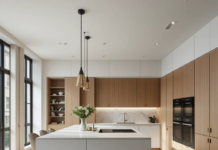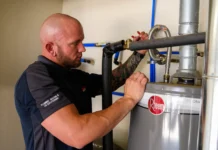Upgrading your home is one of the most effective ways to enhance its appeal and increase its value. However, not all renovations pay off.
In fact, some well-intentioned projects can hurt your property’s resale value or turn off potential buyers. Whether you’re preparing to sell or simply future-proofing your investment, it’s essential to know which upgrades to consider carefully.
Here are some common home upgrade mistakes that could actually lower your property’s value.
Table of Contents
Overpersonalising the design
It’s natural to want your home to reflect your personality, but when it comes to resale value, too much personalisation can backfire. Bold wallpaper, statement colours, or highly specific design choices, like a bright red kitchen or themed décor, can make it harder for potential buyers to imagine themselves living there.
According to real estate professionals from Calnan Property, buyers generally look for spaces that feel neutral, balanced, and adaptable. Overly distinctive finishes or unconventional layouts can limit your home’s appeal and make it feel like a “project” rather than a move-in-ready space.
Ignoring function for aesthetics
A beautifully designed home means little if it doesn’t work well for everyday living. Many homeowners make the mistake of prioritising looks over functionality, leading to awkward layouts, wasted space, or impractical features.
For example, choosing sleek but hard-to-clean surfaces, removing vital storage for a minimalist look, or installing trendy fixtures that don’t suit the space can all affect how comfortable and usable a home feels. While these choices may impress on Instagram, they often leave buyers wondering how the home will perform in real life.
Real estate agents often point out that function sells homes. Buyers want to picture themselves living easily and comfortably in a space. The perfect upgrade balances beauty and practicality, ensuring the home is both stylish and smartly designed.
Cutting corners on DIY projects
DIY projects can be a great way to save money and add personal touches to your home, but cutting corners or skipping professional help can easily do more harm than good.
Poor workmanship, from uneven tiles and sloppy paintwork to unapproved electrical or plumbing jobs, can raise red flags for buyers and even lead to costly repairs later on.
While a quick fix might look fine at first glance, buyers (and building inspectors) notice the details. Low-quality finishes or non-compliant work can reduce your property’s value and slow down the sale process if issues need to be corrected before settlement.
Converting bedrooms into other spaces
It’s common for homeowners to repurpose a spare bedroom into a home office, gym, or walk-in wardrobe, especially with lifestyle changes and remote work trends. While these conversions can be convenient, they can also reduce your property’s overall market value.
The number of bedrooms is one of the most important factors buyers and real estate agents consider when assessing value. Fewer bedrooms can mean fewer interested buyers, especially families or investors looking for rental potential. Even if the rest of the house is beautifully upgraded, losing a bedroom can limit your market appeal and lower your asking price.
Neglecting outdoor appeal
First impressions matter, and your home’s exterior sets the tone before buyers even step inside. Neglecting your outdoor spaces can quickly undermine the appeal of everything you’ve done indoors.
An overgrown garden, peeling paint, broken fencing, or a tired-looking façade can signal to buyers that the property hasn’t been well-maintained.
Outdoor areas are more than just aesthetics. They represent lifestyle. Buyers often look for usable, inviting spaces to entertain, relax, or enjoy family time. Even small improvements, like fresh landscaping, new outdoor lighting, or a tidy deck, can dramatically improve your home’s perceived value.
Overcapitalising on luxury upgrades
It’s easy to get carried away with luxury finishes such as marble benchtops, designer fixtures, imported tiles, or top-of-the-line appliances.
While these upgrades can make your home feel beautiful, they don’t always translate into higher resale value. Overcapitalising happens when you spend more on improvements than you can realistically recover when you sell.
Every neighbourhood has a price ceiling, an upper limit to what buyers are willing to pay, no matter how much you’ve invested in upgrades.
If your property becomes the most expensive on the street, it can actually be harder to sell. Buyers may prefer to purchase a more modest home in the same area or move up to a better suburb for a similar price.
Bottom Line
Not all upgrades are created equal, and sometimes, less really is more. By focusing on quality, functionality, and broad appeal, you’ll not only enhance your living experience but also protect your property’s long-term value.
Before starting any renovation, talk to experienced real estate agents who understand what sells in your area. Their insight can help you invest wisely and avoid costly mistakes that could lower your home’s worth.
Apart from that, if you want to know more about Composite Fencing Panels: A Sustainable Choice for Modern Homes then visit our Home Improvement category.



























